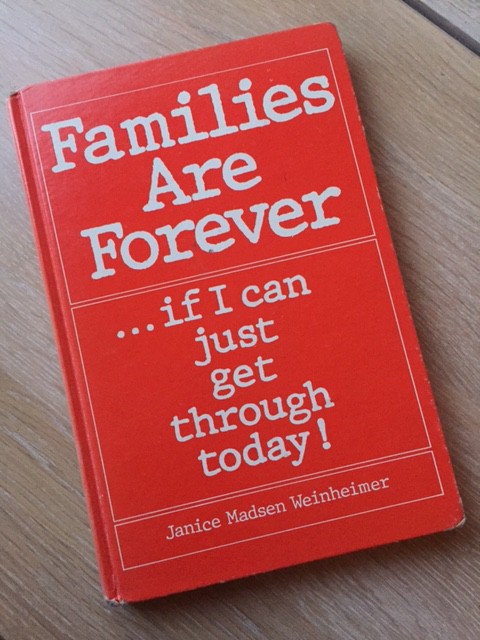One of my favorite parenting books is ‘Families are forever if I can just through today.’
It actually belongs to a friend of my mother’s in Switzerland, but somehow it has ended up in my possession for the last 20-something years.(I’m hoping she has forgotten about it…)
It is an old book – obviously – published way back in 1979 (!). It’s not a very big book – I can easily read it in a couple of hours – and have – several times.
It was recently returned to me, after I lent it to another friend, and since I hadn’t read it in a while, I re-read it again. Well, the first few chapters at least. I realized more than ever how much the book has shaped me and my methods as a mother…
The author, Janice Madsen Weinheimer, and her husband Gerald, had no less than 9 children under the age of 10. First a daughter, then two sets of twins, a set of triplets, and finally another girl. (!)
She shares her experiences and lots of down to earth, no nonsense advice with humor and self-deprecation, but also a strong sense of conviction and faith.
I have figured out that her oldest daughter is 10 years older than me, so it really is a book from another generation. But not necessarily FOR another generation. I truly believe that some, if not most, of her parenting techniques would be perfectly suitable for families today.
I realized that I had adopted many of her methods, although I did tweak them somewhat to suit my temperament and circumstances.
The chapters that I seem to refer to the most are the ones on reverence in church, babies and sleeping, discipline and raising teenagers.
Here are a few excerpts:
On babies and sleeping
Have you ever heard a mother say, “I could manage through the day all right if my baby would just sleep through the night?” I have learned from listening to many such mothers that they train their babies to wake up in the night. I chose to train mine to sleep through the night. I didn’t learn this all at once. Beckie never awoke during the night, so I had no such experience with her. Debbie and Eric, being preemies, awoke regularly during the night at first. But Debbie was soon sleeping through,and after I taught Eric to suck his thumb he began to sleep through also. When we brought Kerry and Kyle home, we used our new system of bottle-feeding in the night. After we had fed them, burped them, changed them, and made sure of their comfort, we put them back to bed. If they cried, I got up and checked once to make sure everything was all right. If they continued to cry, I went back to bed. I didn’t always sleep, but at least I rested. I arrived at a formula of my own for when a baby should sleep through the night. Kerry and Kyle had been born five weeks early, but they were bigger babies and adjusted more easily than Eric and Debbie had. I decided a baby should be able to sleep through the night by the time he is nine pounds or three months old, whichever comes sooner…
……I have learned that generally our children learn to do what we train them to do. If we continually give them a drink every night, we are training them to wake up for it. If we rock them to sleep each night, we are training them not to go to sleep until they have been rocked. If we put them to bed with a bottle, we are teaching them not to go to sleep without one. I was very careful never to put a baby to bed with a bottle because I realized if I did, someday I would have to break the habit. I fed my children in another room, changed them, and then put them down for the night. They whimpered some, but they soon learned to fall asleep on their own….
…One of the books I read said a new baby has an intense desire to suck that is satisfied between the ages of three to four months—if he is allowed to suck as much as he desires. I found this to be true. I gave each of the children a pacifier (which Eric couldn’t keep in his mouth). I let them suck as much as they desired for the first three months. Between three and four months their desire waned, and I threw out the pacifiers. I had two thumb suckers: Eric, whom I taught, and one of the triplets. I never did anything to stifle this, as I’d studied just enough psychology to know not to frustrate them. I never worried about it, and they gave it up on their own after they were two years old.
– I know I have claimed that our children have always been good sleepers. And for the most part they were. However, I was reading through some old journals last week, and read that when Jonah was still being breastfed, he would wake up for a night feed, and Benjamin would also wake up at least once, so I would rarely get more than 2 – 3 hours of uninterrupted sleep a night for a few months that year… Who said that that hindsight was 20/20 vision? 😉
On Reverence in church
…When Beckie was approaching her first birthday, she began to be a handful at church. I was determined that my children would behave at church, but my knowledge and experience were very limited. One (of my) brother(s) had a boy just three weeks older than Beckie, and I couldn’t help noticing how quiet and complacent his son was while Beckie was very active and quite a handful. I asked him how he managed to keep his son so quiet and content. He told me it doesn’t just happen; you have to work at it.
I wasn’t afraid of work, and I decided that if all it took was work, I’d tackle it. I began by sitting and holding Beckie on my lap at home for nearly an hour each
day. She wasn’t allowed to get down from my lap or have toys to play with. She had to learn to sit still. If she wouldn’t, it was easy in the home atmosphere to talk to her about it and be firm with her while no one was watching. She was a very easy child to train, and she became so much in tune to reverence at church that as she got older she folded her arms when we got out of the car at church and wouldn’t unfold them till the meeting was over. One of the counselors in the bishopric told me how impressed he was with her reverence. He told me how one day in Junior Sunday School one of the deacons bumped her with the sacrament tray and water spilled all over her shoulder and down her dress into her lap. She didn’t move a muscle but kept her arms tightly folded. He said she didn’t move even when he quietly went over and wiped her off……Beckie was an exception. I soon learned that. The others weren’t nearly as easy to train, but nevertheless, they were trained. We found out that taking books or toys or dry cereal or other foods to meetings was more of a problem than a help. Children who had nothing to play with or to eat were less fussy than those who had toys and food. Besides, I was taking my children to the Lord’s house, and I wanted them to learn to respect it as such, not as some place to which we go to play and eat. It wasn’t easy, and sometimes it was quite frustrating, particularly when other people could see us struggling and would offer our children a toy or something to eat. … But still I was determined. Training two or three at a time to sit still for an hour each day takes quite a bit of time—at first.But it’s worth all the time and effort in the long run.
…After working at several different methods, I finally arrived at a satisfactory training program for reverence. When a baby reaches his first birthday, he’s old enough to start training. This means that the mother will need to plan an hour each day when she can sit and hold him without interruptions. She should plan it during the other children’s nap time, if possible. She should have a church book for her to read—preferably with no pictures. This way she can get caught up on her reading while she’s sitting each day. I used to prepare my Mutual lessons during this time. The baby is to sit still on mother’s lap during this time. He’s not allowed to get down, but has to sit quietly. When he struggles to move, she simply says “No,” firmly, and tightens her hold till he relaxes. He may whimper or cry a few times at first. She can talk to him kindly and tell him he has to sit on her lap. She should tell him she loves him, but he must learn to sit still so he can be reverent in Heavenly Father’s house.
…As with most new habits, it takes about three weeks for this one to form and become a part of a child’s life. Some more difficult children may resist longer, but even they will eventually give in. Husbands need to help with this program so that the baby learns to behave for either parent. Both parents should be patient and ask the Lord’s help. He will bless their efforts. After the child has been trained, and during his training, if he misbehaves at church we should simply take him out, talk firmly to him, and go back into the meeting. This will reinforce the training he has been receiving at home. We shouldn’t stay out, however, or we may be training the child to cry so that he can get out and do something else. We may have to leave the meeting several times at first, so we should sit on or near the back row. Above all, we shouldn’t resort to crutches. The cereal, books, and toys should be left at home. Children should be taught when they’re young that church is for quiet learning, not for playing and eating.
…Training three children at once to be reverent was quite a problem. We always had to rely on someone else to help hold a baby. We didn’t feel that we could insist that they stick to our methods of keeping the child quiet—especially since they hadn’t worked at it during the week. As a result, whichever child sat with someone else usually ended up with something to play with, which created a problem with the other two. We tried to switch the children around so the helping third party usually got a different baby to hold. During this time, we found it especially appropriate to handle reverence problems during family home evening. We could easily take time then to be firm and talk to the children without it being embarrassing or disturbing. It didn’t hurt to stop a lesson momentarily while reinforcing the reverence program. This training worked so well that we could take eight children to church—ages one through seven—and have them all sit on the bench quietly throughout an entire meeting. Many people commented on how easy it seemed for them to sit there and how reverent they all were. I thought, If they only knew all the hours that had gone into training them to be that way. As my brother had said, “It doesn’t just happen, you have to work at it.”
– I can really vouch for the reverence stuff. No, I never managed to practice for an hour every day with each of mine, but we did practice some, and we did practice during family home evening, and we were pretty consistent at church about not bringing food or toys. (I did allow church books, however, but only after the passing of the sacrament.) If I had to take them out because they were disturbing the meeting, I would hold them on my lap in the RS room, and not let them run around and play. They quickly realized that they preferred the ‘freedom’ of sitting quietly in the chapel, than being constricted to my lap outside. :-). (Yes, I know – I sound like a condescending middle aged know it all, who doesn’t remember what it’s really like in the trenches, and I probably am…Sorry!)

On discipline:
As I have studied the scriptures, the Lord’s way seems to be to establish laws. If you live the law you receive the blessing; if you break the law, you must suffer the consequences.
For example, the Lord told Adam and Eve in the Garden of Eden not to partake of the forbidden fruit. They were told the consequences for breaking the law. Well, they chose to break the law and had to suffer the consequences. The Lord didn’t yell and scream and fly in a rage at them. He merely told them what would be the consequences of their actions. When I was first married, I was determined I would never spank my children, but would teach them the proper way, with love. Beckie’s personality fit right in with my plans. If I ever even said no to her, it seemed to break her heart. To our dismay, most of the other children didn’t come equipped with that type of personality…Deciding upon an effective method of discipline for small children was very difficult for me. I always tried to put as much of the responsibility on the child as I could. The Lord had given Adam his choice, and I wanted to do the same with my children. This is how it worked: after I had given a specific direction to a child, I began slowly counting to ten. If the child chose to obey before I reached ten, everything was fine. If the child didn’t obey by the time I reached ten, he or she received a couple of swats on the bottom—only a couple and always on the bottom. To begin this program with each child, I explained to him before I started counting that I was going to count to ten. If he did as he had been told, everything would be fine, but if he didn’t obey, then I would have to spank him. It didn’t take long till the children really understood what it meant when I started counting. I was careful to be consistent…
…Another thing I was very consistent at doing was showing forth afterwards an increase of love toward him whom I had reproved, lest he esteem me to be his enemy. (See D& C 121: 43.) We don’t want our children to ever think we’re upset with them personally—only with their actions. So I’d give them a few minutes to think about what they’d done, and then I’d sit down and take them on my lap and put my arms around them. I’d explain to them how much I loved them, and how it really hurt me inside (I’d point to my heart) when they were disobedient. I loved them and didn’t want to have to spank them, but Heavenly Father had assigned me to be their mother, and I was responsible for them. If I didn’t teach them the proper way to behave, Heavenly Father would not be pleased with me. I told them again that I loved them and hoped they’d remember next time what was the right thing to do. This seemed to work so well that when I did have to discipline my children, they’d come and stand by me waiting to be reinstated and loved.
…Children need to have rules. They need to know what they can do and what they can’t do. They’re so much more secure if they know what’s expected of them. Children will go just as far as you’ll let them, but they’re much happier when you set the limitations and stick to them.
…If children are to learn responsibility,they must be given choices. Even when my children were small, I always tried to let them make some decisions. I felt it was important that they develop the ability to decide for themselves.
…Giving children choices also helps prevent contention. For example, we may say: “Do you want to go to bed now or in ten minutes?” If we have previously given them choices and they have learned that we always stick with our offer, they will probably choose the “ten-minute” alternative. They might say: “I don’t want to go to bed,” but we simply state that that wasn’t one of the choices, and repeat the offer. It usually only takes a few times till they learn the limits, but we must be consistent.
– Corporal punishment is not legal in Norway – you can literally be fined or the children removed from the home if you spank them. So I wouldn’t recommend her method here – however the being consistent and giving them choices, and using natural consequences, and making sure they know you love them afterwards – I couldn’t agree more.
On raising teens:
…I told them how we tried to train our children to become independent. By the time they were fourteen, I said, we felt the children were old enough to be somewhat on their own. I explained that I’m a worrier and need to know where my children are at all times. However, I trust them completely, and they know this. After their fourteenth birthday, they no longer have to ask if they can go somewhere. We expect them to make their own decisions. We have spent their whole lives up to that point teaching them principles and standards that we’d like them to maintain. After they’re fourteen, they’re on their own to implement the teachings they have received. All we ask is that they keep us informed of their whereabouts so we don’t worry.
…It has been mentioned that listening loving, and trusting are some ways we can keep the doors of communication open. Some door closers are judging, overreacting, not listening, and failing to understand. Too often parents see only their side in a problem situation. Too often they respond with ‘I am the parent. I know what’s right or best under the circumstances. I insist on being obeyed.’ This type of parent never stops to analyze logically. He uses methods that Satan was wont to use in our pre-mortal state. Those methods were unacceptable to the Lord then, and I’m sure they are now. The Lord doesn’t want us to force our children to do what’s right. He wants us to love them into the right way. We should be gentle and kind when we’re trying to be persuasive, never dogmatic and abusive…
– Rereading this chapter of the book, I realized I could have quoted the whole thing… I’m pretty sure I’m already breaching some kind of copyright as it is, so I won’t. But I highly recommend the book. It’s still available (it was re-released in 2012) both in hardcover and as an e-book. I googled the author and discovered that she has written another book: ‘The illness that healed me’, published in 2010. I also found out that ‘Families are forever…’ was wildly popular when it was published, resulting in many, many public speaking assignments for the author. So I guess a few more of my mother’s generation will remember it. I’m curious to know what young mothers today think of it. You who are raising children in the age of entitlement and social media…
Was she too harsh? Would you consider using her methods today? If yes, why? and if not, why not?
My mother did the reverence thing with my siblings when they were small (I was already a teen when she read the book) , and I guess my being very into the the whole reverence issue stems from her influence too. Another really good article about reverence can be read here, and another method I highly recommend, here.
With the renewed emphasis on keeping the Sabbath Day holy and reverence in sacrament meeting, it might be worth taking the time to check them out? And if anyone I know would like to borrow my borrowed copy, just let me know!












